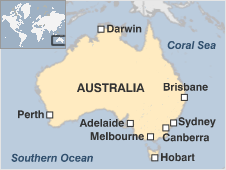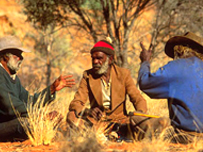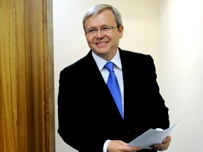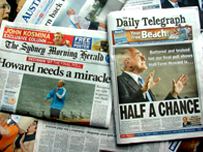Generic Medicines
Taj Pharma is the largest generic pharmaceutical company in India. We hold top positions in different established markets worldwide generics markets..

Modern Australia was founded with the influx of European settlers just over two hundred years ago but the Aborigines inhabited the island continent for tens of thousands of years before that.
They numbered a few hundred thousand before the European influx. But two centuries of discrimination  and expropriation followed and at one point the indigenous population fell as low as 60000.
and expropriation followed and at one point the indigenous population fell as low as 60000.
Australia's politicians at first looked to Europe and the US in foreign policy but in the past 20 years or so they have made their near neighbours a priority.
The British founded the first European settlement in 1788 and named it Sydney. Many of the first settlers were convicts but free settlers started to arrive in increasing numbers particularly after the discovery of gold in the mid-19th century.
AT-A-GLANCE
 Politics: The Labor Party under Kevin Rudd won a landslide victory in elections in November 2007 ending more than 11 years in power for the Liberal Party under John Howard.
Economy: The strong services-based economy has seen sustained growth; mining and agriculture provide the lion's share of exports
International: Australia is a regional policeman; further afield its troops are in Iraq and Afghanistan
|
Today just over 90% of the population are of European descent with less than 3% descended from the indigenous Aboriginal population.
The government formally apologised in 2008 for the past wrongs committed against the indigenous Australians who still suffer from high rates of unemployment imprisonment and drug abuse.
The gradual dismantling of the "White Australia" immigration policy in the decades after World War II heralded an increase in the number of non-European arrivals.
Migration continues to shape Australia and is a politically-sensitive issue. The country has taken a tough stance on unauthorised arrivals but has scrapped a controversial policy of holding asylum seekers in detention centres until their cases are heard.
Originally composed of six separate colonies of the British Empire Australia's path to independent statehood began with the formation of a common federal state in 1901 and was largely complete by World War II. The last few remaining constitutional links with the United Kingdom were severed in 1986.
However Australia remains part of the British Commonwealth and the UK monarch remains the formal head of state represented by the governor-general who has a largely ceremonial role.
There is an influential republican movement and the debate over future of the monarchy is a recurring issue in Australian politics. In a 1999 referendum nearly 55% of Australians voted against becoming a republic.
The country has federal structure with the six states retaining extensive powers particularly over education police the judiciary and transport.
Australia's growing orientation towards its Asian neighbours is reflected in its economic policy. It is a key member of Apec the Asia Pacific Economic Cooperation forum and aims to forge free trade deals with China and Asean the Association of Southeast Asian Nations.
It has also played a bigger regional role mediating between warring groups in Papua New Guinea and the Solomon Islands as well as deploying thousands of peacekeepers in newly-independent East Timor.
The island continent combines a wide variety of landscapes. These include deserts in the interior hills and mountains tropical rainforests and densely-populated coastal strips with long beaches and coral reefs off the shoreline.
Isolated from other continents Australia has an abundance of unique plant and animal life.
Head of state: Queen Elizabeth II represented by Governor-General Quentin Bryce
Prime minister: Kevin Rudd
Kevin Rudd and his Labor Party swept to power in elections in November 2007 ending more than 11 years of conservative rule.

Kevin Rudd Mandarin-speaking former diplomat
|
Mr Rudd a Mandarin-speaking former diplomat put global warming and keeping Autstralia's export-fueled economic boom at the top of his priorities.
His first official act was to ratify the Kyoto Protocol on climate change which he said demonstrated his government's commitment to tackling greenhouse gas emissions.
His predecessor John Howard leader of the Liberal Party had always rejected ratification.
Mr Rudd promised to quickly overturn several of Mr Howard's key policies including controversial labour laws and Australia's military deployment to Iraq.
A few months into his premiership the government made a formal apology for the past wrongs caused by successive governments on the indigenous Aboriginal population. Mr Rudd also reversed Australia's longstanding policy of detaining all asylum seekers upon arrival.
He presented himself to voters as a new-generation leader and was expected to forge closer ties with China and other Asian nations than Mr Howard. He worked in Australia's Beijing embassy in the 1980s.
Mr Howard who was in office for four terms said he was bequeathing a nation which was "stronger prouder and more prosperous" than it had been when he came to power.
Australia's media scene is creatively technologically and economically advanced. There is a tradition of public broadcasting but privately-owned TV and radio enjoy the lion's share of listening and viewing.
 Media ownership rules have been relaxed
|
Ownership of print and broadcast media is highly-concentrated. For example four major media groups own 80% of Australia's newspaper titles.
The Australian Broadcasting Corporation (ABC) runs national and local public radio and TV stations as well as Australia Network a TV service for the Asia-Pacific region. The other main public broadcaster is the Special Broadcasting Service (SBS) whose radio and TV networks broadcast in many languages.
National commercial TV is dominated by three large networks. Commercial broadcasters have to carry a minimum percentage of Australian-made programming. Pay-TV services have gained a substantial foothold. Digital TV is available via satellite cable and terrestrially.
Sport news game shows imported and home-made dramas top the TV ratings in Australia. The industry has successfully exported some of its productions to English-speaking markets overseas.
More than 70% of Australians use the internet.
The John Howard government changed the regulations governing media ownership. The rules introduced in 2007 allow for greater cross-ownership of press and TV outlets as well as higher levels of foreign ownership.
The press
Television
Radio
News agency/internet
ABC Newsonline - public broadcaster ABC's news site

AFRICA | ASIA-PACIFIC | AMERICAS | EUROPE | MIDDLEEAST | SOUTHASIA
![]()
![]()
![]()
Mauritania Mauritius Morocco Mozambique Namibia Niger Nigeria Republic-of-congo Rwanda Sao-tome-and-principe Senegal Seychelles Sierra-leone Somalia South-africa Sudan Swaziland Tanzania The-gambia Togo Tunisia Uganda Australia Brunei Burma Cambodia China East-timor Fiji Indonesia Japan Kazakhstan Kiribati Kyrgyzstan Laos Malaysia Marshall-islands Micronesia Mongolia Nauru New-zealand North-korea Palau Papua-new-guinea Samoa Singapore Solomon-islands South-korea Taiwan Tajikistan Thailand The-philippines Tonga Turkmenistan Tuvalu Uzbekistan Vanuatu Vietnam Antigua-and-barbuda Belize Bolivia Brazil Canada Chile Colombia Costa-rica Cuba Dominica Dominican-republic Ecuador El-salvador Grenada Guatemala Guyana Haiti Honduras Jamaica Mexico Nicaragua St-kitts-and-nevis St-lucia Suriname Trinidad-and-tobago Uruguay Venezuela Albania Andorra Armenia Austria Azerbaijan Belarus Belgium Bosnia-hercegovina Bulgaria Croatia Cyprus Czech-republic Denmark Estonia Finland France Georgia Germany Greece Hungary Iceland Ireland Italy Latvia Liechtenstein Lithuania Luxembourg Macedonia Malta Moldova Monaco Montenegro Norway Poland Portugal Russia San-marino Serbia Slovakia Slovenia Spain Sweden Algeria Egypt Iran Iraq Israel-and-palestinian-territories Jordan Kuwait Lebanon Libya Mauritania Oman Saudi-arabia Sudan Syria Tunisia United-arab-emirates Yemen Afghanistan Bangladesh Bhutan India Nepal Pakistan Sri-Lanka The-Maldive